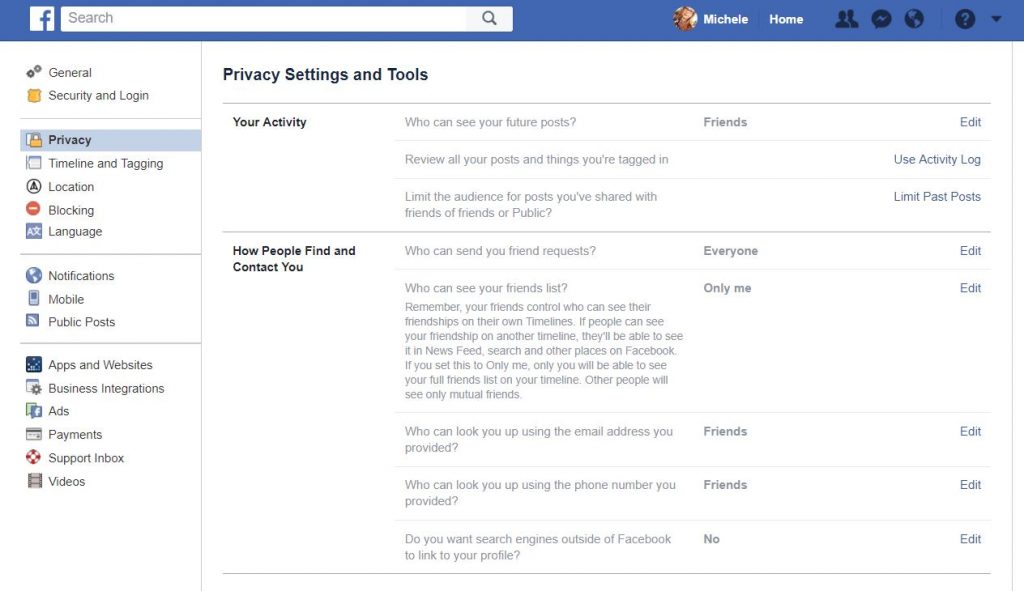Facebook Privacy Breach Aftermath
So, it’s been awhile since the Facebook/Cambridge Analytica privacy breach and the aftermath reveals a new landscape for social sharing and privacy.
Here are a few thoughts and tips to get you more secure on line:
- Change your privacy settings on your Facebook profile so your friends list remains anonymous. Only “mutual friends” will see who you are friends with. This will prevent identity thieves from creating a profile of who you are, who you are related too and also from approaching your friends pretending to be you, ie “I’m stuck in Europe, I just got robbed can you e-transfer me some money?”. Go to Settings – Privacy Settings and Tools – Who Can See Your Friends List? – select ONLY ME … see the example below:

- Don’t share Facebook posts saying something like “Many of my friends won’t share or even like this but if Breast Cancer has touched you some how, like this post and then copy and paste on to your timeline” or here is one that was circulated recently …
“Maybe if people’s heads weren’t buried in the sand of ignorance and they took the time to understand, instead of judging and thinking it won’t happen to them because they have the perfect family, life would be a little bit easier for people that do experience this!
This hits close to home for me, for family and friends who live under this shadow.
The days of ‘it’ not being talked about or being taboo should be over…”
These are phishing posts and hackers try to find the most vulnerable accounts (the ones who have public posts and public friend lists). The hackers put keywords into these narrative posts like “sand of ignorance” in the first line of this post above so they can easily use those strings of words and search them up in the search box located at the top of every Facebook page. This will show every person who ever shared this post on their timeline and has an open public Facebook profile. The narratives are strong worded and challenging to the friends of people who share this type of post, sort of saying … you are not a good enough person or don’t care enough to share this post. It preys on peoples personal sensitivities so the hackers get a huge amount of response from this type of hacking campaign. After they find the most vulnerable accounts the hackers start to create a mirror account that twins you and makes your friends and family believe it’s actually you.
- Another post you should never share or do is the “Let’s find out about each other” … the questions are mostly benign like what is your favourite ice cream flavour etc. but out of 30 some questions, they ask your birthdate, favourite teacher’s name, favourite movie etc. All questions that are used for security answers on bank accounts and online merchant sites. So again, hackers will search up these types of posts and look for the most vulnerable accounts and begin to build an identity profile, age, sex, location, kids, partner, potential passwords, etc.
Here’s a recent one that has been travelling around Facebook, don’t ever do these and share them on your timelines. I know they seem fun and benign but if you really want people to know this stuff, call them up and have a nice chat or get together for a coffee and visit with someone!
“I wish more people did these. It’s fun to learn things about people…😊😊😊
▪Favorite Smell – Lilacs
▪First job: McDonald’s
▪Current job – Bank Teller
▪Dream job – Photographer
▪Astrological Sign – Pisces
▪Favorite Pizza- Mushrooms
▪Birthdate – March 13, 1918
▪Favorite dog- Yorkshire Terrier …
Come on…someone do this with me. Let’s take a break from the negativity & learn about each other. It’s FUN! Hold finger on post, hit copy & paste to your status!”
- In regards to the political landscape when you share posts about how much you can’t stand a particular candidate all you do is increase their relevance! Relevancy is a very powerful on line measurement and it does not matter if you are saying the worst things about the candidate you despise, every time you post about them you give their campaign more energy just by using their name, even if it is all negative energy. The only way to divert this relevancy measurement is by lifting up the candidates you do like and stop trashing the ones you don’t. I know you don’t want to unintentionally promote a campaign leader you would never support, so make sure you don’t post about them on social media, you just give them more power and increase their relevancy ranking. If you want to trash them in a conversation with someone in real life, have at it!
- Finally, for anyone who thinks that Facebook or Cambridge Analytica care about your last ski trip or what you ate at that new fancy restaurant downtown, they don’t. What they are MOST interested in is all the private conversations on Messenger. This is where they do their deepest data mining to discover the true essence of political sway, philandering spouses, corporate cultures etc. They might not be too interested in you and me but they are definitely able to access these private messages anytime they want. So don’t fall into a false sense of security when you are sending private DM’s or messages to people, they are all accessible, not by the general public but by Facebook and third party organizations they sell access too like advertisers and market researchers such as Cambridge Analytica.
